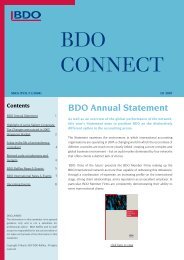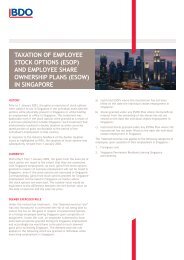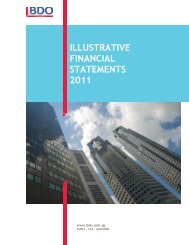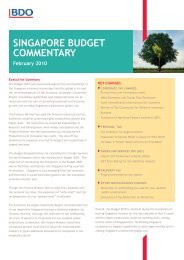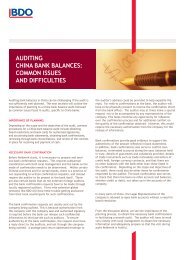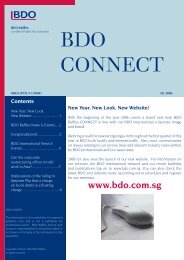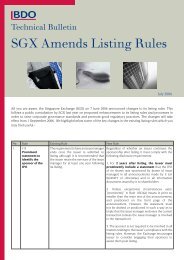Draft BDO Raffles Newsletter April 2005.pmd
Draft BDO Raffles Newsletter April 2005.pmd
Draft BDO Raffles Newsletter April 2005.pmd
Create successful ePaper yourself
Turn your PDF publications into a flip-book with our unique Google optimized e-Paper software.
<strong>BDO</strong> RAFFLES CONNECTCROSS BORDER INSOLVENCY -The People’s Republic of ChinaIntroductionWith the economic reform measures implementedby the Chinese government before the twenty firstcentury, many local companies have set upbusinesses in China, with much encouragementfrom the Singapore government. Indeed, theChinese market is huge comparatively to the othercountries within the region and the opportunitiesthere are remarkable.However, for various reasons like the competitiveeconomic climate in China and its distinctivebusiness culture, not many local companies areable to sustain its businesses there and /or havefaced difficulties in recovering their investmentsthus leading to insolvency. Critical questions thatneed answering BEFORE venturing into China are:what is the insolvency practice in China?how are we, as creditors, protected or cansuch risks be minimized if our debtors defaultin payments?Under general lawCross-border insolvency procedures to beexecuted in China shall generally comply with anumber of general principles. Under theConstitution of the People’s Republic of China,Articles 18 and 32, any foreign enterprise,economic organization and individual shall abideby the Chinese laws, and their lawful rights andinterests shall be protected under Chinese lawsand jurisdiction.Chinese laws recognize international conventionsand bilateral or multilateral treaties. China mayoffer or provide judicial assistance andcooperation to those countries that haveparticipated in the conventions and treaties basedon reciprocity.China’s general attitude towards recognition andenforcement of foreign court judgment is asfollows:Based on international treaties and bilateralagreements joined by China or on reciprocity.Chinese courts may not recognize nor executeforeign court judgments and rulings in thosecases over which Chinese courts havejurisdiction, for example, Hong Kong.After being recognized or executed byChinese courts, foreign court judgments andrulings may have equal effect with the Chinesecourt decisions.Assisting legislationThe Chinese bankruptcy law system iscomplicated and is composed of the BankruptcyLaw for State Owned Enterprises, bankruptcyprocedures non-state owned enterprises,bankruptcy policies made by the centralgovernment and a series of local bankruptcyregulations. There have been no specificstipulations for international insolvency. Crossborder insolvency may generally apply the CivilProcedure Law and stipulations provided by theinternational treaties and bilateral judicialassistance agreements joined in by China.The Civil Procedure Law and relevant bilateraljudicial assistance agreements have madeseveral stipulations provided for the procedure ofrecognition and execution of foreign court rulings.Foreign court judgments may be recognized andexecuted by the Chinese courts if the followingconditions are met:According to China law, the court that made thejudgment shall have the jurisdiction over thecase;According to the law of the country in which thejudgment was made the judgment becomeeffective;The lawful rights and interests of the litigantshave been and are duly protected;Chinese courts have already arrived at alegally effective judgment on a case with thesame litigants and the identical object ofaction; or the case is already heard by theChinese courts; or the Chinese courts haverecognized the judgment of a court (legallyeffective) of a third country;The judgment is in conformity with theprinciples of Chinese law and does not impairthe Chinese sovereignty and security nor theChinese social and public interest.Insolvency practiceIn the absence of any judicial assistanceagreement between China and the foreign country,the Chinese courts’ usual practice will permit theadministrator to bring an action directly to theChinese courts provided the foreign administratorand the insolvent accept the jurisdiction of Chinesecourts. A foreign creditor requesting to seizeproperty located in China may be allowed, afternegotiation and mediation to realize his rights onhis foreign debtor’s property in China by way ofshare transfer.Article contributed by Clara Teu of our Business Recovery and Restructuring DepartmentTel: 6828 9159 Fax: 6828 9111 Email: clarateu@bdo.com.sg3



